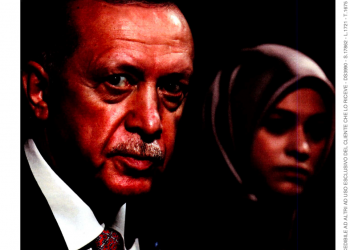Algeria these days is facing major security concerns. The abduction and decapitation of the French climber Hervé Gourdel in the Kabylie area, by a new local offshoot of ISIL:
Jound al-Khalifa (The Soldiers of the Caliph), who earlier have, dutifully, expressed allegiance, in the traditional Islamic way, to the self-proclaimed Caliph of ISIL: al-Baghdadi. This shows quite clearly that the military have been unable to clean up the Kabylie mountains from the remnants of terrorist elements and other related radical groups after over two decades of military operations involving thousands of soldiers trained, apparently, in terrorists’ manhunt and equipped with the most advanced weaponry designed for this particular mission.
This leads one to ask the following two important and vital questions:
1- Is the powerful Algerian army ANP (Armée nationale populaire), considered by experts to be one of the best equipped in Africa, only powerful on paper? Or is it, perhaps, that the troops are not convinced by fighting their Muslim brethren? If it the case, then, this is a situation of pure insubordination, which means that the army has a discipline problem, or even worse that, it could be that, maybe, some high – ranking officers are either sympathizing with the Islamists or don’t like the army’s handling of present internal affairs.
2- This abduction of a foreigner in a highly militarized and highly policed country shows that, maybe, the army, which is the power behind the thrown, is deeply engrossed in something else and is overlooking important security arrangements and issues.
All in all, as Shakespeare said in Hamlet: “Something is rotten in in the state of Danemark” [Hamlet (1.4), Marcellus to Horatio].
Indeed, in less than two years, two major security breaches have been registered in Algeria. The first one was the Tiguentourine, near In Amenas, terrorist episode of January, 16, 2013 commandeered by the notorious radical Salafist Mokhtar Belmokhtar known as “Mr. Marlboro”, for his illegal traffic in cigarette contraband business in the Sahara desert, and for his links with al-Qaeda.
The attack on the Tiguentourine gaz facility was prepared by the infamous Belmokhtar and executed by his lieutenant Abdul al –Nigeri. After four days of siege, the Algerian special forces raided the facility. In the action, 39 hostages were killed alongside with a security guard. Many European countries whose hostages were killed believed that whole thing was a botched rescue military operation and showed lack of professionalism on the part of the army, or, rather, to be precise the infamous and too powerful DRS (Department of Intelligence and Security).
Dalia Ghanem-Yazbeck questions in Carnegie Endowments’ electronic journal Sada the efficiency of DRS in fighting terrorism:
« Yet over the past year, the institution, namely its aging generals, have come under criticism after the botched response to the attack on the gas complex in Tiguentourine near In Amenas on January 16, 2013. Prior incidents also called in question the management of the military and DRS, including the kidnapping of three European NGO members in the refugee camp of Tindouf on October 24, 2011, terrorist attacks by the Movement for Unity and Jihad in West Africa (MUJAO) against the territorial branch of the National Gendarmerie of Tamanrasset on March 3, 2012, and the abduction of seven Algerian diplomats in Gao on April 5, 2012. More recent attacks on the police station in Ouargla on June 24, 2012 highlighted the failures of DRS leaders, and rendered it important for the army itself to take some action ; this provided the impetus for September’s dismissals. »

Maybe, in the end, these countries were hard on the Algerian Government because none of them were informed or consulted prior to the launch of the operation in question, but the Algerians had a hot potato in their hands. It must be pointed out, however, that the Algerian officials are extremely culturally sensitive to their independence of decision and initiative. For them, it is question of manhood and personal pride (nif). Foreigners, friends or foes have to mind their own business when it comes to Algerian internal affairs.
Since the last terrorist attack, official Algeria is kind of paralyzed, the actual head of state, President Bouteflika, who has been in power for 15 years, and to whom the country owes the “Charter for Peace and National Reconciliation” that allowed the return to peace in the country. Thanks to his concord pact, the terrorists, with “no blood on their hands”, benefited from a total amnesty on laying arms and returning to civil life.
The pact brought peace and return to normalcy to Algeria, but in the mountains and the Sahara desert the radical Islamists operatives remained active and formed in January 2007 a new terrorist group that expressed allegiance to the nebulous al-Qaeda organization. This group called itself al-Qaeda in the Islamic Maghreb (AQIM.) AQIM is the transformation of the Algerian radical Salafist group: The Salafist Group for Preaching and Combat (GSPC), which was founded by Hassan Hattab, who broke with GIA in1998 over their slaughtering of hundreds of civilians.
This shows that there are still many dangerous terrorists in the mountainous areas of Algeria and worse than that, these elements have porous brains and can easily switch to the side of the most dangerous Islamist groups such as IS. Jound al-khalifa, are not only unhappy with the establishment, and this is something that dates back to 1992 but they cannot stand their own several groupings existing either in the north or the south of Algeria.
This quick and clean hit and run operation undertaken by this IS cell or maybe group, shows that the Algerian military intelligence DRS is truly questionable in many ways. The DRS Department of Intelligence and Security, was created in 1958 as Ministry of Ammunition and Connections, prior to Algeria’s independence. After the departure of the French, it became the pivotal center in the country, close to the presidency, with eyes and ears everywhere. Its mission was and, certainly, still is today, more than ever, to protect the state and the government. For the ordinary Algerian, DRS was founded to protect the ruling class of generals and politicians and their financial interests and riches they derive from oil revenues because in their own belief, they are the ones, who, through FLN (Front de Libération National) fought and gained independence and should be the legitimate depository of power and wealth in the country.
For John R. Schindler, the secretive and powerful DRS is a very suspicious and multi-faceted organization:
Algeria, like Pakistan, has a military intelligence service, the Department of Intelligence and Security (DRS), whose remit far surpasses any Western security agency. The DRS is rightly seen as the regime’s backbone, with a powerbase beyond even the military. In a real sense, as in Pakistan, the military’s spies control much of the political system, functioning as a law unto themselves, committing human rights abuses and providing clandestine support for terrorist groups to further the service’s interests.
So why is it that the omnipresent DRS did not sense the danger coming from the Algerian IS? The answer is two-fold hypothesis: DRS knew but did not want to do anything.
-
First fold of the hypothesis:
DRS sensed the danger coming but did nothing to stop it, to show to the world at large that wants democracy in Algeria, that this country cannot be ruled by democracy now, but needs the strong army to protect it from the Islamists like in 1992 when the FIS won the first half of the elections and prepared to take power; and
-
Second fold of the hypothesis:
Recently Bouteflika has been flown to Switzerland for medical attention and care, according to the Algerian opposition in Paris. Apparently, he is terminal and the army is looking for a new president and a new front man. General Mohamed Lamine Mediene nicknamed Taoufik is both powerful and ambitious and is looking forward to this post. This way he could be President of Algeria with the powerful DRS arm at his service, to intimidate the people and potential opponents. General Mediene is not the only hopeful for this post but he is, certainly, the best placed for the position.
prof. Mohamed Chtatou
© RIPRODUZIONE RISERVATA



















Comments 1